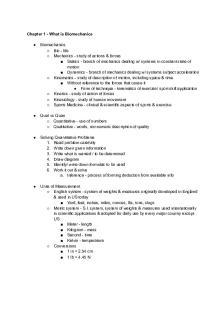Study Guide Exam 1 (Completed) PDF

| Title | Study Guide Exam 1 (Completed) |
|---|---|
| Author | Matthew Twardowski |
| Course | Elementary Psychology |
| Institution | Purdue University |
| Pages | 8 |
| File Size | 170.7 KB |
| File Type | |
| Total Downloads | 60 |
| Total Views | 151 |
Summary
PSY 120 Study Guide Exam 1...
Description
StudyGuide,Exam#1 Belowisacomprehensiveoutlineofthematerialyouneedtohavemasteredfromeachunit–hopefully itwillhelpyouquizyourselfasyoureviewyournotes.Don’tf ocusonanythingthatisn’tonthisstudy guide.T ohelpyouout,youwillseeanindicaonofwhetherthelistedconceptwascoveredjustinthe book,justinthelecture,orinbothplaces.Youwillknowthatyoureallyunderstandandremember somethingifwhenyoulookatablankcopyofthestudyguide(withoutbeingabletopeakata nynotes), youcanexplaintheconceptfullyinyourownwordstoanimaginaryaudience(orbeeryet,getastudy buddya ndtryexplainittothemasifyouaretheteacher).Also,b eawarethatf orallt heconceptsbelow, youmights implyg ettestedonyourmemoryforabasicdefinion,ory oumightn eedtoapplyamore thoroughunderstandingoftheconcepttoanexample. Theexamwillbe50quesons,T/Fandmulplechoice.Unlikethequizzes,theexamisclosed book/closednote.Youwillhavefrom10:30‑11:45toworkonit.Wemeetinourregularclassroom. Bringa#2pencilandyourstudentIDnumber!!Ify ouarriveanylaterthan10:45,youwillneedtomake planstotakeamake‑uptest.Classroomdoorswillcloseat10:45s otest‑takersc anfocusinaquiet environment.
CHAPTER1 : Defininga ndD escribingP sychology 1. Whatisthedefinionofpsychology?Makesureyoucanalsoexplain/definewhatismeantby thevariouspartsofthedefinion–i.e.whatismind,whatisbehavior,andwhatism eantbythe scienceo rscienficstudyofthosetwothings?)(Bothlecture&book)scienficstudyof behaviorandmind* 2. Beabletodescribe/idenfyexamplesofthe4goalsofpsychologythatwediscussed(describe, predict,understand,modify)(lecture)describepredictunderstandmodify 3. Beabletodescribeandidenfyexamplesofthe3commonmisconceponsofpsychologythat wediscussedinclass,andunderstandwhytheyarem isconcepons(justlecture)mental disorders,predictindividualbehavior,nobeerthanlogic 4. Whatisaclinicalpsychologistandwhatdoeshe/shedo?Howisthisdifferentfroma counseling psychologistsandwhatapsychiatristis?(Bothlecture/book)treatsmentaldisorders,psychican prescribemeds 5. Whatisaresearchpsychologistandwhatdoeshe/shedo?(Bothlecture/book)research 6. Whatisanappliedpsychologistandwhatdoeshe/shedo?(Bothlecture/book)praccalusefor psych
Tracingt heD evelopmento fP sychology:A B riefH istory 7. Whatisthephilosophicalposionknowna sempiricism?( justbook)knowledgefrom experience
8. Whattwodisciplinesdidpsychologydevelopoutof?(justbook)philosophy&physiology 9. Whatisthephilosophicalposionknowna snavism?(justbook)knowledgeatbirth 10. WhatisGestaltpsychology?(justbook)principlesandperceponcan’tbealteredby experience 11. Explainthestructuralismapproachtopsychology,andknowwhichtwopsychologistswere associatedwiththisschooloft hought(Bothbook&lecture)(Wundt&Titcher)analyzefeelings andbehavior 12. Whatisthetechniqueofsystemacintrospecon?Whichapproachtopsychologywasbest knownforrelyingonthistechnique?(Bothbook&lecture)lookinwardtodescribeexperiences 13. Describethefunconalismapproachtopsychology.Whowasthemostfamousp sychologist menonedinclassandinyourbookthatwasassociatedwiththisapproach?(Both book/lecture)(WilliamJames)funcon/purposeo ffeelingsandb ehavior 14. Describethebehaviorismapproachtopsychology(bothlecture&book).Whowasthemost famouspsychologistviewedastheleaderofthismovement(justbook)?(Watson)how environmentaffectsbehavior 15. Whatmeframewastheheightofthebehaviorismmovement?Knowwhetherthebehaviorism movementcamejustaerorjustbeforethes tructuralism&funconalismmovements,andbe ablet odescribehowthetechniquesofbehaviorismweredifferentfromtheseapproaches(both lecture/book).(1900’s)struct(analyzingfeelingsandsensaons),funct(whydidudothat?), behave*(affectedbychildhood) 16. Beabletodescribethekeycharacteriscsofpsychoanalysis,(orthepsychodynamica pproachto psychology),andknowwhowasmostassociatedwiththedevelopmentofpsychoanalysis(both lecture/book)(Freud)problemsatchildhoodaffectunconsciousadultmind* 17. Beabletodescribewhatismeantbyhumaniscpsychology(bothlecture/book)focuson humanpotenalandgrowth*
Idenfyingt heF ocuso fM odernP sychology 18. Inmodernpsychology,knowwhatismeantbytheecleccapproach( justbook)lookatmulple sourcesandnotjustone 19. Inmodernpsychology,knowwhatismeantbythecogniverevoluon(bothbook/lecture)less behavior,moreconsciousandunconsciousmind 20. Inmodernpsychology,knowwhatismeantbythebiologicalapproach(bothbook/lecture)how bodyinfluencesbehaviormindandfeelings 21. Inmodernpsychology,knowwhatismeantbyevoluonarypsychology(bothbook/lecture) naturalselecon 22. Inmodernpsychology,knowwhatismeantbytheconsideraonofculturalfactors,orthe socioculturalapproach(bothbook/lecture)howsocietyandcultureaffectsbehavior
CHAPTER2 : 1. Define/understanddescripveresearch(justbook)observeanddescribebehavior
2. Define/understandreacvity(justbook)behaviorchangeswhenparcipantknowsthey’re beingobserved 3. Define/understandnaturaliscobservaon.Doesnaturaliscobservaonnormallycomewith theadvantageofhighexternalvalidityorhighinternalvalidity?( justbook).Observe parcipantsinanaturalseng 4. Define/Understandcasestudies(justbook)anindividualstudied 5. Define/Understandwhatasurveyis(justbook)limitedinfofrommanypeople 6. Define/understandthebasicprinciplesofs amplingw henconducngasurvey.I.e.Whatisa populaon?Whatisasample?Whatisrandomsampling,andwhydoesitproducea representavesample(asopposedtobiasedsample)?( justbook)pop:enregroupofpeople, samp:fraconofthatpopulaon,randomsamp:everyonehasequalchanceofbeingselected 7. Whatisanachievementtestandwhatisanaptudetest?(justbook) 8. Beabletodefine&understandhowtocomputethefollowingmeasuresofcentraltendency: mean,mode,median( justbook)mean:avg,mode:most,median:middle 9. Definevariability,anddefinethefollowingtwomeasuresofvariability:range,andstandard deviaon(justbook)howscoresdiffer 10. Whatareinferenalstascs?(justbook)techniquestodecideifdataisrepresentaveofa populaon 11. Definetheoryandhypothesis( justlecture)queson/predicon 12. Understandwhatindependentanddependentvariablesareandbeabletoidenfythemin examples(bothbook/lecture)IVmanipulatedDVmeasured 13. Understand,define,a ndbeabletoidenfyexamplesofanoperaonaldefinion(both book/lecture)howconceptscanbeobservedo rmeasured* 14. Acorrelaonalapproachinvolvesjustobservingtoseeifthereisanexisngrelaonship betweentwovariables,orwhethertwovariablesvarytogethersystemacally.(E.g.Isittrue thatasaggressiongoesup,atendencytowearblackT‑shirtsgoesup?Isittruethatas intelligencegoesup,qualityofphysicalhealthalsogoesup?Isittruethatasaveragemespent int hegymgoesup,weightgoesdown?)M akesureyouunderstandwhatacorrelaonis,and knowwhataposiveandnegavecorrelaonis.Hint:Beabletoidenfyavisualdepiconof eachkindofcorrelaononagraph(book/lecture)pos:increaseincrease,negave:decrease decrease 15. Doescorrelaonalresearchallowresearcherstopredictbehavior?Doescorrelaonalresearch allowresearcherst oidenfythecauseofbehavior?( bothb ook/lecture)correlaonisnot causaon 16. Beabletodescribeandunderstandthe3“hallmarks”ofanexperimentalapproach–i.e.what makesanexperimentanexperiment?(hint:y oumusthave1)controlofallothervariables,2) manipulaonofanindependentvariable,and3)randomassignmenttocondions.Knowwhatis meantbythesethings)(bothlecture/book)1.Controlvariables,manipulateIV,random assignment 17. Knowwhatthebenefitisofane xperimentaldesign.Whatdoesanexperimentallowyouto concludethatacorrelaonalapproachdoesnot?(hint:itestablishescause‑effectrelaonships anda llowsyoutoEXPLAINBEHAVIORINSTEADOFJUSTPREDICTBEHAVIOR!)(both book/lecture)allowsonetoexplainbehavior
18. Understandwhyrandomassignmentisnecessary,andw hyNOTdoingrandomassignment threatensyourabilitytoconcludethattheindependentvariablecausedthechangeinyour dependentvariabilitywhenyourunanexperiment(bothlecture/book)nobiasedparcipants 19. Whatisacontrolgroupandwhyisitnecessary?(bothbook/lecture)somethingnormalto comparedatawith 20. Whatisaconfoundingvariable?(justbook)anunwantedvariablethatchangesalongwiththe IV* 21. Whatisinternalvalidityandwhatisexternalvalidity?(bothbook/lecture)Knowwhetherthe followingdesignstendtobehighorlowoneachofthese:1)experimentsdoneinthelab,2) correlaonalstudiesdoneinthefield,and3)quasi‑experimentalstudiesdoneinthefield(just lecture)internal:howwellthestudyisdone,external:howwellthestudyrelatestotheworld 22. Understandwhataquasi‑experimentaldesignis–idenfyexamples.Whatmakesa quasi‑experimentdifferentfromanexperiment?(justlecture)norandomassignmenttoagroup 23. What’saplacebo?(justb ook)somethingtomaketheCGthinktheyrebeingtested 24. What’sasingleblindstudy?(bookandlecture)parcipantsdon’tknoww hichisCGandwhich isnt 25. What’sadoubleblindstudy?(bookandlecture)parcipantorresearcherdoesn’tknowwhich groupiswhich 26. Makesureyoureviewthedifferencesbetweenreliabilityandvalidity,andbeabletodefineand applyt hemtoexamples.Bighint:Beabletoidenfysomeimagest hatrepresenthighandlow validityandhigha ndlowreliabilityfromthepowerpointslides(justlecture)r eliabilityishow crediblethedatais,validityishowclosedataistoeachother 27. Whatisinformedconsent?(justbook)askingparcipantconsentbeforeexperiment 28. Whatisdebriefing?(justbook)tellingparcipantaboutexperimentaer 29. Whatisconfidenality?(justbook)keepingparcipantdataconfidenal
CHAPTER3 : 1. Define,understand,andb eabletoapplythefollowingbasicideasofevoluon(justlecture): Variaon:differencesbetweenorganisms Naturalselecon:survivaladvantageforsome Heritability:theabilitytopasschangestooffspring Sexualseleconisa“specialcase”ofnaturalselecon.Sexualseleconactsonano rganism's abilitytoobtain(oenbyanymeansnecessary!)orsuccessfullycopulatewithamate. 2.Knowt he3mainthingsnatureselectsfor(justlecture): Foodaainment Predator/dangeravoidance Reproducvefactors 3. Beabletoexplainwhypeoplesaythenaturevs.nurturedebateisaFALSEDICHOTOMY.( i.e.how mightnatureandnurtureactuallyworktogethertodeterminehumanbehavior?Whatisthe interaconistperspecve?)( justlecture)natureandnurturegohandIhadandonedepends ontheother
4. Whatisamajorcauono ftheevoluonarymodelofhumanbehavior?(hint:cantherebea discordbetweenmodernenvironmentandevolvedinsncts…..?Doall“evolved”insnctsserve usp erfectlyinourmodernenvironmentnow?)( justlecture)workedforancestorsmightnot workforusnow 5. Whatismeantbytradeoffs?(lecture)increasedp hysicaltraitsfromsurvivalmaydecreasesex traitsforrecreaon 6. ClarkandHaieldstudy(1978)–Knowtheapproximatepercentagesofmenandwomenwho toldacompletestrangeroftheoppositesexthattheywouldbewillingto1)Goout,2)Goback totheirplace,3)Havesex(justlecture)goout55each,gobackB78G38,sexB 78G0 7. HowwouldanevoluonarypsychologistexplaintheClark&Haieldresults?i.e.Describewhy, duringt heeraofevoluonaryadaptedness,menwhoadoptedashort‑termmangstrategy wouldhavesuccessfullypassedontheirgenesmoreoenthanwomenwhoadopteda short‑termmangstrategy(parentalinvestment–whatisit?)( justlecture)womanbodyclock. Guysgetsexandw omenget9monthsofpregnancy 8. Whataresensoryn eurons?(justbook)carryenvironmentalmessagestobrain 9. Whatareinterneurons?(justbook) 10. Whataremotorneurons?(justbook)carrymessagestoperformmovement 11. Whatareglialcells?( justbook)nervecellsthatallowneurontocommunicateeffieciently 12. Knowwhatthefollowingpartsofaneuronare,whattheydo,andbeabletolabelthemina diagramofaneuron:Myelinsheath,dendrites,soma,axon,terminalbuons(both book/lecture) 13. Whatisasynapse?(bothbook/lecture)gapforneuronstoc ommunicate 14. Whatisresngpotenal?(bothbook/lecture)posiveoutside,negaveinside* 15. Whatisaconpotenal?(bothbook/lecture)allornothing* 16. Whatareneurotransmiers(bothbook/lecture)chemicalmessanged* 17. Whatisacetylcholine?(justbook)linkedtoalzheimers 18. Whatisdopamineandwhatd oesitdo?Whatdisordersareassociatedwithdopamine problems?(bothbook/lecture)pleasureandrewardsystem,schizophreniaandp arkinsons 19. Whatisserotoninandwhatdoesitdo?Whatdisordersareassociatedwithserotoninproblems? (bothbook/lecture)relaxaonandhappinesslinkedt oeangdisordersanddepression 20. WhatisGABAandwhatdoesitdo?WhatdisordersareassociatedwithGABAproblems?(both book/lecture)regulatesanxiety 21. Whatareendorphinsandwhatdotheyd o?( justbook)brainspainkillers* 22. Whatisarefractoryperiod?(justbook)meperiodaeraconpotenalwhereaconcan’tbe performed 23. Whatdoesthecentralnervousc onsistof?(bothbook/lecture)brainandspinalcord 24. Whatistheperipheralnervoussystem?(bothbook/lecture)autonomicandsomac 25. Whatiscontrolledbythesomacsystem?Whatiscontrolledbyt heautonomicsystem?Arethe somacandautonomicsystemspartoftheperipheralorcentralnervoussystem?(both book/lecture)auto:involuntary,som:voluntarymovements 26. Whatdoesthesympathecdivisionoftheautonomicsystemdo?Whatdoesthe parasympathecdivisionoftheautonomicsystemdo?(bothlecture/book)s ym:fight/flight para:r elaxaon
27. Forthepartsofthebrain,pleasereviewt hepartsonthebraincheatsheetuploadedunder “pracceacvies”o nblackboard.Anyquesonsa boutbrainpartsw illcomefromthislist. (bothbook/lecture) 28. WhatchangedinPhineasGageaerhisinjury?Whatpartofhisbrainwasinjured?(both book/lecture)frontallobe,personality* 29. Whatisthefunconofthecorpuscallosum?(bothbook/lecture)communicatebetweenthe hemispheres 30. Thehemispheresofthecerebralcortexarespecializedtoperformcertaintasks.Whatisle hemisphereresponsiblefor,a ndwhatistherighthemisphereresponsiblefor?(both book/lecture)le:logicright:personality 31. Whenitcomestophysicalmovement,thelehemispherecontrolsmovementonwhichsideof thebody?Therighthemispherecontrolsmovementonwhichsideoft hebody?(both book/lecture)le:rightviceversa 32. Whenitcomestothevisualfield,informaonreceivedthroughtheeyestravelstoonesideof thebrainortheother.Ifyou’relookingstraightahead,animagecomingfromthelevisualfield getsprojectedtowhichbrainhemisphere?Anim...
Similar Free PDFs

Study Guide Exam 1 (Completed)
- 8 Pages

Completed Final Exam Study Guide
- 6 Pages

Completed Enhanced Study Guide
- 34 Pages

Exam 1 Study Guide
- 1 Pages

exam 1 study guide
- 5 Pages

Exam 1 study guide
- 6 Pages

Exam 1 Study Guide
- 6 Pages

Exam 1 Study Guide
- 12 Pages

Study Guide Exam 1
- 9 Pages

EXAM 1 Study Guide
- 3 Pages

Exam 1 Study Guide
- 14 Pages

Exam 1 study guide
- 21 Pages

Exam 1 study guide
- 13 Pages

Study guide Exam 1
- 24 Pages

Exam 1 study guide
- 5 Pages

Exam 1 Study Guide
- 2 Pages
Popular Institutions
- Tinajero National High School - Annex
- Politeknik Caltex Riau
- Yokohama City University
- SGT University
- University of Al-Qadisiyah
- Divine Word College of Vigan
- Techniek College Rotterdam
- Universidade de Santiago
- Universiti Teknologi MARA Cawangan Johor Kampus Pasir Gudang
- Poltekkes Kemenkes Yogyakarta
- Baguio City National High School
- Colegio san marcos
- preparatoria uno
- Centro de Bachillerato Tecnológico Industrial y de Servicios No. 107
- Dalian Maritime University
- Quang Trung Secondary School
- Colegio Tecnológico en Informática
- Corporación Regional de Educación Superior
- Grupo CEDVA
- Dar Al Uloom University
- Centro de Estudios Preuniversitarios de la Universidad Nacional de Ingeniería
- 上智大学
- Aakash International School, Nuna Majara
- San Felipe Neri Catholic School
- Kang Chiao International School - New Taipei City
- Misamis Occidental National High School
- Institución Educativa Escuela Normal Juan Ladrilleros
- Kolehiyo ng Pantukan
- Batanes State College
- Instituto Continental
- Sekolah Menengah Kejuruan Kesehatan Kaltara (Tarakan)
- Colegio de La Inmaculada Concepcion - Cebu